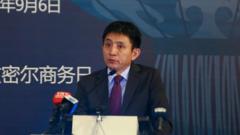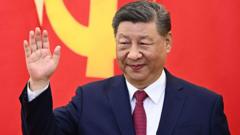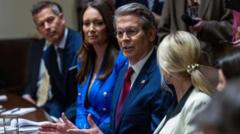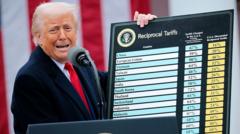US Commerce Secretary Howard Lutnick defends tariffs imposed on uninhabited islands populated only by marine life, amid claims from Australian officials describing the decision as a "rushed process."
US Tariffs on Uninhabited Islands Spark Controversy and Confusion
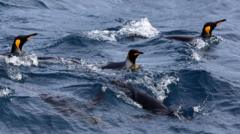
US Tariffs on Uninhabited Islands Spark Controversy and Confusion
The imposition of unexpected tariffs on the remote Heard and McDonald islands raises eyebrows among Australian officials.
In a surprising move, the US government has implemented tariffs on the remote Heard and McDonald islands, despite them being uninhabited and known primarily for their wildlife, including penguins and seals. During recent interviews, US Commerce Secretary Howard Lutnick justified the tariffs as necessary to close “ridiculous loopholes” that might allow foreign countries to bypass standard trade routes to the US. In a conversation with CBS following the tariff announcement, Lutnick stated, “If you leave anything off the list, the countries that try to basically arbitrage America go through those countries to us."
Australian authorities expressed astonishment upon learning about the tariffs. Trade Minister Don Farrell described the decision as “clearly a mistake” and indicated it came about through a "rushed process." The remote islands, located approximately 4,000 km (2,485 miles) from Australia, have limited trade interactions with the US, often exporting insignificant amounts of goods. Despite this, Lutnick emphasized that the tariffs were part of President Trump’s broader strategy to disrupt international trade practices that he feels undermine the US economy.
The unexpected tariff has drawn attention from various sectors and raises questions about the intricacies of global shipping practices. According to public policy organization Pew Charitable Trusts, an established method in the shipping industry called transshipment can be exploited by offenders to manipulate shipping data, potentially allowing fraudulent activities to occur. While actual exports from the Heard and McDonald islands to the US were minimal, the US had imported a total of US$1.4 million worth of unspecified “machinery and electrical” products from the territory in 2022.
Alongside these islands, the British Indian Ocean territory was also included on Trump's tariff list. This territory, primarily occupied by military personnel, showed an export value of a mere US$414,350 to the US in 2022, indicating that the recent tariff decisions are not limited to solely uninhabited islands but extend to territories with military significance. As stakeholders continue to assess the ramifications of these tariffs, experts warn that such measures could send ripple effects through both local and global economic markets.







